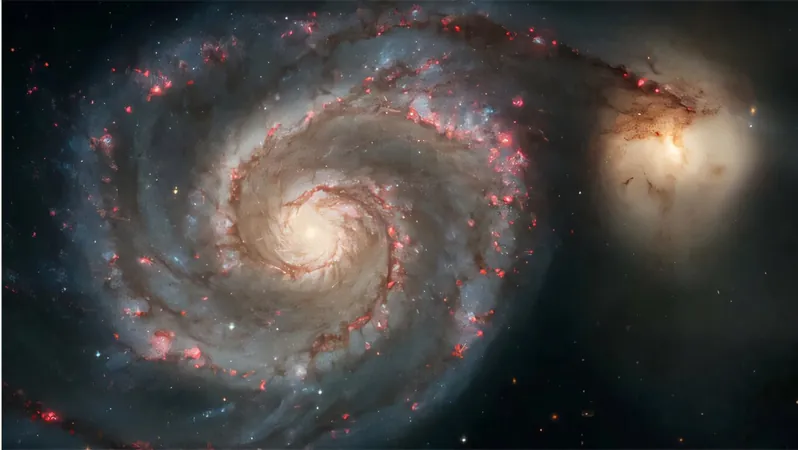
Could a Slowly Spinning Universe Finally Solve the Hubble Tension?
2025-04-14
Author: Li
Revolutionary Findings from Astronomical Research
Exciting new research from the Monthly Notices of the Royal Astronomical Society, led by István Szapudi from the University of Hawaiʻi at Mānoa Institute for Astronomy, proposes a mind-boggling idea: the universe may be rotating, albeit at an astoundingly slow pace. This revelation could hold the key to one of the most perplexing issues in modern astronomy.
A Philosophical Twist to Cosmic Motion
In a twist reminiscent of Greek philosophy, Szapudi echoes the thoughts of Heraclitus, suggesting that if 'everything moves' ('panta rhei'), perhaps 'everything turns' ('panta kykloutai'). Current astronomical models present a uniformly expanding universe without any signs of rotation, a theory that fits most observations but fails to explain the notorious Hubble tension.
The Hubble Tension Explained
The Hubble tension refers to the ongoing conflict between two methods of measuring the universe's expansion rate. One approach uses distant supernovae, calculating distances to galaxies and providing an expansion rate spanning billions of years. Meanwhile, the second method relies on ancient relic radiation from the Big Bang, reflecting the expansion rate from around 13 billion years ago. These methods yield dramatically different values, creating a conundrum that has stumped scientists.
A Groundbreaking Mathematical Model
Szapudi and his team crafted a groundbreaking mathematical model that first adhered to standard cosmological principles before introducing a minuscule rotation factor. Surprisingly, this seemingly trivial adjustment resolved the Hubble tension without contradicting existing astronomical measurements.
What Does This Mean for Our Universe?
The proposed model suggests that if the universe is indeed rotating, it completes one full turn every 500 billion years—too gradual to detect with current technology, yet substantial enough to influence the ongoing expansion of space. Most intriguingly, this notion aligns with alternative models that incorporate rotation.
No Breaks on the Laws of Physics—What's Next?
This revolutionary idea does not violate any established laws of physics, offering a potential explanation for why measurements of the universe's growth seem at odds. The next exciting step will be to transform this theory into a comprehensive computer model and devise methods to detect evidence of this slow, cosmic spin.




 Brasil (PT)
Brasil (PT)
 Canada (EN)
Canada (EN)
 Chile (ES)
Chile (ES)
 Česko (CS)
Česko (CS)
 대한민국 (KO)
대한민국 (KO)
 España (ES)
España (ES)
 France (FR)
France (FR)
 Hong Kong (EN)
Hong Kong (EN)
 Italia (IT)
Italia (IT)
 日本 (JA)
日本 (JA)
 Magyarország (HU)
Magyarország (HU)
 Norge (NO)
Norge (NO)
 Polska (PL)
Polska (PL)
 Schweiz (DE)
Schweiz (DE)
 Singapore (EN)
Singapore (EN)
 Sverige (SV)
Sverige (SV)
 Suomi (FI)
Suomi (FI)
 Türkiye (TR)
Türkiye (TR)
 الإمارات العربية المتحدة (AR)
الإمارات العربية المتحدة (AR)